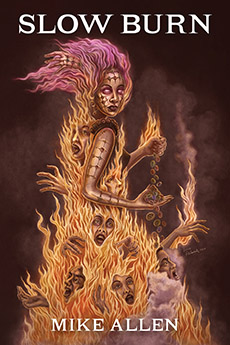Featured Poem II • June 2017
bn ʾdnbʿl bn ʾdrbʿl
Sonya Taaffe
Tophet-ghost, I cannot see your face between the shadows of Scipio’s dream and Dido’s lament, the goddess who raises her arms above your name lost in Roman vengeance more lasting than a poet’s breath. Who were you whose voice Baʿal Ḥammon heard, Gaius Julius Ariš, sea-trader, stay-at-home, freedman or freeborn? Whose bones cracked like lime in the heat of your vow— grief or sacrifice, young cinders in ancient clay? Two thousand years too late, I will learn your abjad alongside your alphabet, your library of stones and potsherds, bowls and seals. Whatever blood I spill, your shade will not rise to it, no more than Hannibal from the ash of Aeneas’ love.

Sonya Taaffe’s short fiction and poetry can be found most recently in the collection Ghost Signs (Aqueduct Press) and in the anthologies Heiresses of Russ 2016: The Year’s Best Lesbian Speculative Fiction, The Museum of All Things Awesome and That Go Boom, and An Alphabet of Embers: An Anthology of Unclassifiables. She lives in Somerville with her husband and two cats and once named a Kuiper belt object.
About the roots of this poem, she wrote, “Thanks to Gemma Files, I got a 2nd-to-1st-century-BCE limestone stele from the tophet of Carthage stuck in my head. It was dedicated in thanks to the god Baʿal by one Gaius Julius Ariš, who said as much in the four-line inscription below the image of the goddess Tanit with her arms upraised; the title of this poem quotes the third line, where he refers to himself with traditional Carthaginian patronyms, naming his father and his grandfather. The usual difficulty with abjads and vowels applies. The first name is often rendered ‘Adonibal,’ the second ‘Adirbal.’ Both are of Semitic origin. ʾdn is cognate with Hebrew אדון—adon, ‘lord.’ ʾdr is cognate with Hebrew אדיר—adir, ‘mighty.’ The names therefore mean ‘Baʿal is lord,’ ‘Baʿal is mighty.’ ʾrš is a popularly attested Punic name of disputed antecedents; it is regularly rendered ‘Arish.’ The taking of two additional Latin names in the style of the traditional Roman tria nomina intrigues me—I was reminded of the conventions governing the names of freedmen, who would adopt the praenomina and nomina of former owners and use their own original names as cognomina. But that might not have been it at all. I know nothing more of him than this stone and these words in a language I know only by analogy. Time has eaten whatever else there was.”
![]()
If you’ve enjoyed what you’ve read, please consider pitching in to keep us going. Your donation goes toward future content.
![]()















